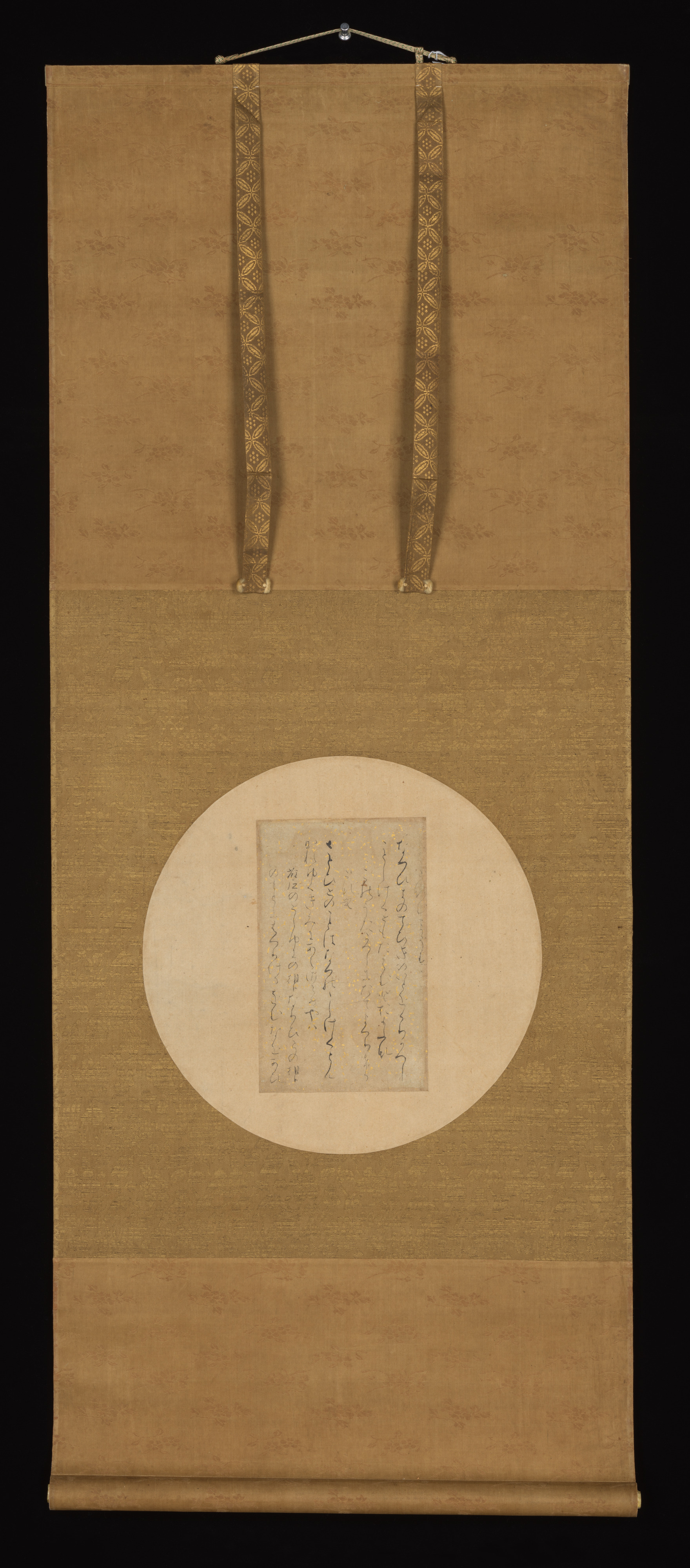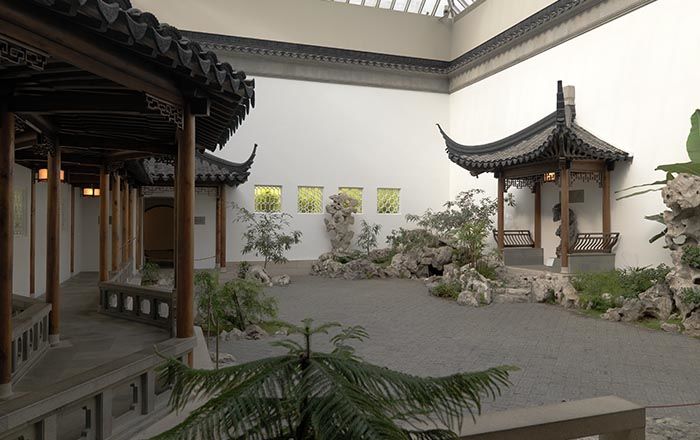Two Poems about Palace Gossip from the “Collection of Poems Ancient and Modern” (Kokin wakashū), one of the Ōe Fragments (Ōe-gire)
Traditionally attributed to Fujiwara no Sadayori Japanese
Not on view
On gold-flecked mica paper, a calligrapher well practiced in writing kana, the Japanese phonetic writing system, has delicately transcribed two ancient court poems on the perennially relevant theme of Japanese palace gossip about affairs of the heart. The handling of the brush is graceful but firm; the strands of kana flow smoothly, but there are no flamboyant displays of exaggeratedly long ligatures or embellishment of curving strokes. The calligraphy is crisp and austere, but refreshing in feeling—a model cherished through the ages. Originally this sheet, now attractively mounted as a hanging scroll with a circular mounting window, was a page from a bound booklet containing all 1,111 poems from the Collection of Poems Ancient and Modern (Kokin wakashū), compiled in 905. The poems, both anonymously composed, are from Book 14 of the anthology, which comprises poems on the topic of “Love.”
Most of the pages of what is assumed to have been a two-volume set that comprised the transcription of the anthology, to which this once belonged, have long been lost to the ravages of time—no pages from the first half of the anthology survive. A large part of Book 13 (Love II) and some pages from Book 14 (Love III), the same book as here, is owned by the Imperial Household Agency. Only another couple of dozen pages are known, making this an exceedingly rare example. The “Ōe-gire” are among the earliest surviving transcriptions of the Kokin wakashū anthology. Each page was coated with mica and is decorated with silver and/or gold flecks, as here. The elegant calligraphy closely resembles other cherished calligraphic exemplars such as the Genshin volume of the Honganji Version of the Thirty-Six Poetic Immortals (Honganji sanjūrokunin kashū) or the Karasumaru-gire 烏丸切 (fig. 2a; 2015.300.232).
The surviving “Ōe-gire” pages are traditionally attributed to the courtier-poet Fujiwara no Sadayori, or sometimes to the eminent courtier-calligrapher Fujiwara no Yukinari (972–1027), but both the paper decoration and style of writing place it in the early twelfth century. We cannot be sure, but it seems that the name “Ōe-gire” refers to the fact that some of the detached pages were once owned the warlord Mōri Motonari, who was descended from the Ōe clan.
The lightly brushed characters on the far right, reading “to namu mōsu” となむもうす comprise the last part of a comment on the previous poem (no. 702), which reads in full as “It is said that this poem [about rumors growing like wild vines] was sent by the Emperor to a female court attendant from Ōmi.”
The two columns, comprising three and two lines respectively, of poem 703 from the anthology, read as follows:
なつひきのてひきのいとをくりかへし
ことしけくともたえむとおもふな
Natsubiki no
tebiki no ito o
kurikaeshi
koto shigeku tomo
taemu to omou na
Like long threads
spun by hand
all through the summer,
rumors are repeated endlessly,
but don’t try to stop them!
The indented lines that follow comprise a comment on the preceding poem:
このうたかえしにたてまつりけるとなむ
Kono uta kaeshi ni tatematsuri keru to namu
The above poem is said to have been offered in reply [to the Emperor’s poem].
To inscribe the next poem, the calligrapher re-inked her or his brush, and once again transcribed the poem in two columns, breaking between the third and fourth lines:
さとひとのことはなつのゝしけくとも
かれゆくきみにあはさらめやは
Satobito no
koto wa natsuno no
shigeku tomo
kareyuku kimi ni
awazarame ya wa.
Though the rumors people spread
are as rank as the summer fields,
how could I cope
if your love for me withered
and we could not meet?
The final two columns comprise the opening lines of the headnote to the next poem (no. 705), which is by Ariwara no Narihira:
藤原のとしゆきの朝臣なりひらの朝臣のもとにはへりけるをむなをあい。。。
Fujiwara no Toshiyuki no ason, Narihira no ason no moto ni haberikeru onna o ai….
When Fujiwara no Toshiyuki was paying a visit to a woman who lived in Lord Narihira’s house [he wrote the following poem on the lady’s behalf…]
(Translated by John T. Carpenter)
Due to rights restrictions, this image cannot be enlarged, viewed at full screen, or downloaded.
This artwork is meant to be viewed from right to left. Scroll left to view more.



